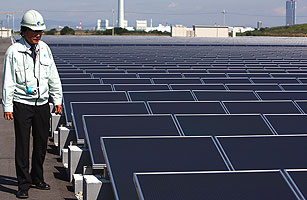
Seven/Eleven Japan, with over 13,200 stores nationwide, is among the many forward-looking companies helping set the pace for change within the nation’s energy policy. The convenience store chain plans to spend over $123 million to switch to energy efficient LED lighting at about 6000 outlets in Tokyo, and will install solar panels on roofs of 1,000 stores around the country over the next few months. This would not only save 125KW a day per store but also benefit manufacturers of LED lighting and solar cell panels — a win-win for all.
Japan’s Fukushima Daiichi nuclear power plant accident, the
world’s second worst nuclear disaster after Chernobyl, has left a
gaping hole — and perhaps a new opportunity — in Japan’s energy policy. At a press conference last week, Prime Minister Naoto Kan effectively scrapped Japan’s plan for increasing domestic electricity supply. “Under the current energy policy, by the year 2030 more than 50% of Japan’s electricity will come from nuclear power generation and 20% from renewable energy sources,” he said. “However, we now have to go back to the drawing board and conduct a fundamental review of the nation’s basic energy policy.” Renewable energy experts agree that the ongoing nuclear crisis, while tragic, could be a remarkable opportunity to move away from the country’s focus on nuclear power development and imported fossil fuels toward solar, wind, biomass, geothermal and other natural domestic sources.